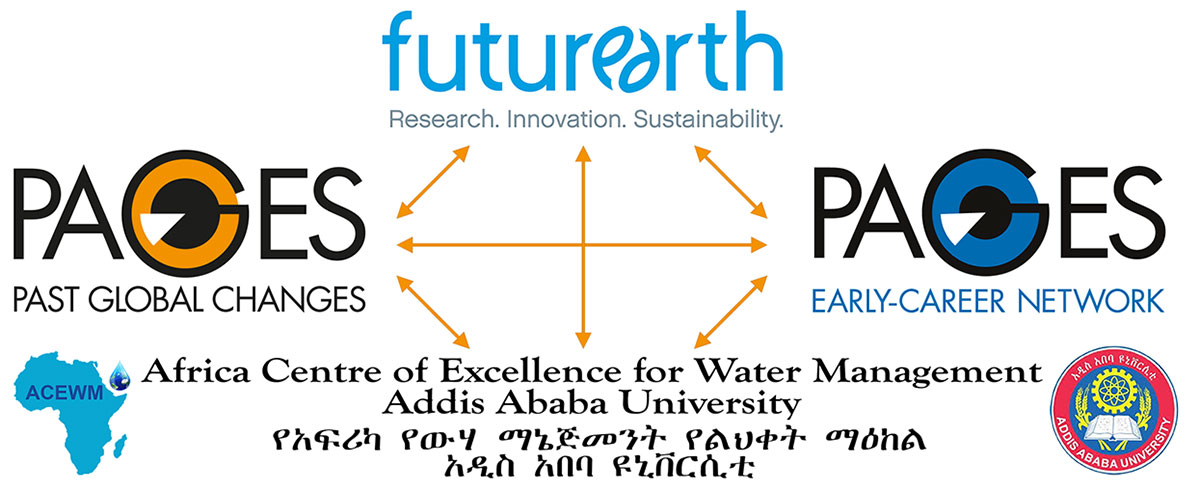- Home
- Publications
- PAGES Magazine
- Paleoscience Symposium: Paleoclimates and Paleoenvironments
Paleoscience symposium: Paleoclimates and paleoenvironments
Asrat A
Past Global Changes Magazine
27(2)
90
2019
Asfawossen Asrat
Addis Ababa, Ethiopia, 28 March 2019
PAGES' 2019 Scientific Steering Committee (SSC; pastglobalchanges.org/about/structure/scientific-steering-committee) and Executive Committee meetings were held from 25-27 March 2019 in Addis Ababa, Ethiopia, hosted by the School of Earth Sciences of Addis Ababa University. Following the meetings, a one-day Paleoscience Symposium on paleoclimates and paleoenvironments was held at the College of Natural and Computational Sciences of Addis Ababa University. Finally, SSC members participated in a two-day field excursion to the Main Ethiopian Rift from 29-30 March 2019.
The symposium (pastglobalchanges.org/calendar/2019/127-pages/1930) was co-organized and hosted by the African Center of Excellence for Water Management (ACEWM) and well attended by ~100 participants including PAGES SSC members, staff members of the College, early-career researchers, and postgraduate students of ACEWM (from Ethiopia, Malawi, Rwanda, Tanzania and Uganda). The symposium featured 11 talks followed by very interactive discussions.
To start the symposium, ACEWM Director Feleke Zewge introduced the center, which is an initiative of the Government of Ethiopia and the World Bank Group. It was established to address the water challenges in Africa with a focus on eastern and southern African countries, with a particular focus on training a critical mass of Africans through short-term training and MSc/PhD degree programs as a means to address national and regional water development needs using a holistic, integrative and transformative approach.
The subsequent three talks introduced Future Earth (Hannah Moersberger), PAGES (Marie-France Loutre) and the PAGES Early-Career Network (Stella Alexandroff; Fig. 1). These talks, besides highlighting the major features and objectives of the respective networks, emphasized the need for African researchers to be actively involved in the associated initiatives and activities, and indicated some possible avenues for such involvement. These talks prompted an extended discussion on the challenges African researchers, and particularly early-career researchers, face in their endeavors to network and collaborate with research initiatives and groups in other parts of the world.
The ensuing presentations by SSC members focused on paleoclimatic and paleoenvironmental studies from various parts of the world. These included an overview of recent products and progress of the PAGES 2k Network focusing on Africa2k (Mike Evans), reliability of future climate model predictions with particular emphasis on the challenges of modeling the hydrological cycle in North Africa (Paul Valdes), past perspectives on tipping elements in the Atlantic Ocean and South America (Cristiano Chiessi), and the use of paleoecology in exploring ecosystem resilience at biome boundaries in southern Africa (Lindsey Gillson). The afternoon session featured some examples of paleoclimatic and paleoenvironmental research in Ethiopia, particularly on speleothem paleoclimatology (Asfawossen Asrat) and paleoecology and tree-ring paleoclimatology (Zewdu Eshetu), as well as the impacts of climate change on the future of coffee farming in Ethiopia (Sebsebe Demissew).
The presentations piqued the interest of many of the postgraduate students who raised several interesting and challenging questions, making the sessions truly interactive. The sessions, as well as the coffee breaks, helped postgraduate students and early-career researchers to freely interact with SSC members. The symposium successfully achieved its objectives of providing targeted information about Future Earth, PAGES and the PAGES Early-Career Network and aroused the interest of many young African researchers who plan to champion the causes of these networks and initiatives. At the same time, the symposium helped these young Africans interact, discuss and network with prominent paleoscientists from various parts of the world, and explore possible avenues of collaboration.
affiliation
School of Earth Sciences, Addis Ababa University, Ethiopia
contact
Asfawossen Asrat: asfawossen.asrat aau.edu.et
aau.edu.et
